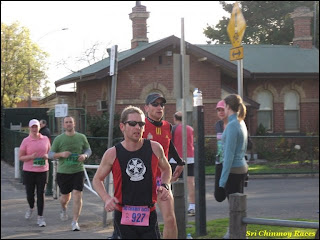Marathon Pace - More Numbers

I've used the following numbers to guide my training:
- Extend my basic endurance so this point goes beyond 26km
- Decrease the relative intensity/effort required to maintain marathon pace
- Increase the ability sustain the higher effort level beyond the endurance threshold
I like the idea of working on all three points.
True Marathon Intensity
The common advice and usual aim of marathon pacing to maintain something very close to a steady and even pace throughout the whole event. Recommendations vary slightly between aiming for an exact even split, a negative split and a slight positive split for various reasons. Essentially the recommendations all aim for a variability of less than +/- 2% of the average pace. In reality very few people achieve this so-called ideal. For most, a marathon race involves a number of ups and downs in pace, feeling, intensity, emotion and not to mention the requirements of changes in terrain. Most marathon World Records have been achieved with near even splits. While the running speed may be relatively consistent, the effort level rarely is. There is the concept of increasing heart rate due to factors such as dehydration, decreases efficiency, shift in substrate metabolism, and other aspects of fatigue. Further there is often an associated increase in oxygen consumption/ventilation rate. Reduction in ventricular efficiency, possible mild pulmonary oedema and changes in cellular permeability are further factors occurring in a marathon.
It seems to be accepted average marathon pace is just below the a person's anaerobic threshold. Unfortunately defining the anaerobic threshold is an endless argument in itself. Further beyond separating marathon pacing between extremes of 5, 4, 3 or 2.5 hours, it is a very poor indicator of predicting an accurate finishing time. Elite athletes showed a significant amount of oxygen consumption and heart rate increase between 3 and 10km of running at marathon pace.
Arbitrary
The numbers are a good guide, but a guide is all they can be. I'll use them to guide my, do some runs above, below and at race pace. See how I respond and take it from there for race day. Then hope I can get that bit extra out of myself on race day.


Interesting numbers Jason.
ReplyDeleteImproving on all three would seem like a good idea.
My thoughts are the most reliable way to break 3 hours would be to extend the basic endurance. You could possibly combine this with #3 by doing, say, a 27k easy run followed by 10k at best effort.